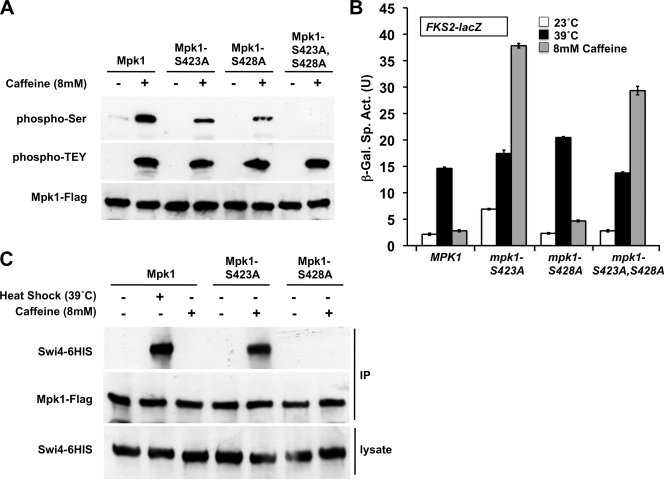FIG. 8.
Behavior of Mpk1 mutants that block serine phosphorylation induced by caffeine. (A) Ser423 and Ser428 of Mpk1 are phosphorylated in response to caffeine. Yeast strain DL456 (mpk1Δ), transformed with plasmids expressing FLAG-tagged Mpk1 (p2313) or Ser-to-Ala mutant forms (S423A [p2824], S428A [p2825], or S423A S428A [p2826]) were subjected to caffeine stress (+), and extracts were processed for detection of serine-phosphorylated Mpk1 (phospho-Ser), activated Mpk1 (phospho-TEY), and total Mpk1 (Mpk1-Flag) as described in the legend to Fig. 7. (B) Blocking phosphorylation of Mpk1 at Ser423 allows caffeine-induced cell wall stress to drive FKS2 transcription. An FKS2-lacZ reporter plasmid (p2052) was transformed into yeast strains with the indicated MPK1 alleles integrated into the genome (MPK1 [DL3929], mpk1-S423A [DL3930], mpk1-S428A [DL3931], and mpk1-S423A S428A [DL3932]). Transformants were grown as described in the legend to Fig. 2A and subjected to thermal or caffeine stress or maintained at 23°C. β-Galactosidase activity was measured in crude extracts. β-Galactosidase specific activity (in units) [β-Gal Sp. Act. (U)] is shown on the y axis. Each value represents the mean and standard deviation (error bar) from three independent transformants. (C) Blocking phosphorylation of Mpk1 on Ser423 allows caffeine-activated Mpk1 to bind Swi4. Yeast strain DL456 (mpk1Δ), cotransformed with plasmids expressing FLAG-tagged Mpk1 (p2313) or Ser-to-Ala mutant forms (Mpk1-S423A [p2824] or Mpk1-S428A [p2825]) and Swi4-6HIS (p2418) were subjected to heat shock or caffeine stress (+), and extracts were processed for coimmunoprecipitation of Swi6 with Mpk1 as described in the legend to Fig. 6B.

